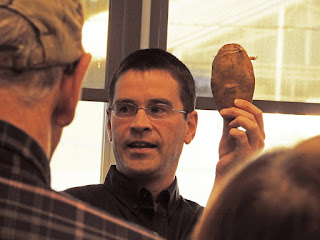NATURE MONCTON INFORMATION LINE, November 24, 2019 (Sunday)
To respond by e-mail, please address your message to the information
line editor, <nelsonpoirier435@gmail.com>
Please advise the editor if any errors are noted in wording
or photo labelling. Note that corrections, deletions, or delayed additions may
not always appear on the Info Line and email transcript but will always appear
on the BlogSpot. For this reason, it is recommended that those wishing to look
at historical records use the BlogSpot rather than the email
transcript. The BlogSpot can always be accessed from the website.
Info Line #: 506-384-6397
(384-NEWS)
** Jane LeBlanc shares some photos taken during
their recent visit to the Hawk Cliff protected area in Ontario, of nice open,
flight views of a RED-TAILED HAWK [Buse à queue rousse], clearly showing the
patagial bar that is specific to both the adult and juvenile Red-tail Hawk, as
well as the dark-spotted belly band against the white breast. The second photo,
of a NORTHERN HARRIER [Busard Saint-Martin], shows its long tail and slender
wings, but a few rather symmetrical primary feathers are missing.
** A big thank-you to Kelly Honeyman, the
J.D. Irving staff naturalist, and to Andrew McCartney, for spending their
Saturday afternoon delivering a presentation to a large group of participants.
Kelly spent time reviewing how unique forest
locations are found and protected, as well as projects involving Moose and
White-tailed Deer tracking, bird monitoring and more.
Andrew demonstrated how they go about
collecting embryos from the seeds of “plus trees” and growing them in culture
media to create a supply of superior seedling trees for planting, and how they are
retained over long periods in liquid nitrogen.
He also spent time explaining how very
complex potato seed production really is. A large room of shelves, lit by red
and blue spectrum light, to demonstrate vertical agriculture was an eye-opener.
He also showed how they have discovered an endophytic fungus that can be
incorporated into seedling trees to help resist attacks by spruce budworm.
An awesome afternoon. Information and
demonstrations of what can and will take place! Several photos of some of the
highlights are attached.
A value added bonus to a great day was a group
dinner at a local restaurant to be followed by a clear sky view of the planets
Venus and Jupiter and a very bright shooting star (meteor) en route home.
Nature Moncton
VENUS AND JUPITER. NOV. 23, 2019. BRIAN STONE
RED-TAILED HAWK. NOV 12,2019. JANE LeBLANC
NORTHERN HARRIER. NOV 12 2019. JANE LeBLANC
IRVING RESEARCH LAB VISIT (HOSTS). NOV 23, 2019. BRIAN STONE
IRVING RESEARCH LAB VISIT. NOV 23, 2019. BRIAN STONE
IRVING RESEARCH LAB VISIT. NOV 23, 2019. YVES POUSSART
IRVING RESEARCH LAB VISIT. NOV 23, 2019. BRIAN STONE
IRVING RESEARCH LAB VISIT. NOV 23, 2019. BRIAN STONE
IRVING RESEARCH LAB VISIT. NOV 23, 2019. BRIAN STONE
IRVING RESEARCH LAB VISIT. NOV 23, 2019. BRIAN STONE
IRVING RESEARCH LAB VISIT. NOV 23, 2019. BRIAN STONE
IRVING RESEARCH LAB VISIT. NOV 23, 2019. BRIAN STONE
IRVING RESEARCH LAB VISIT. NOV 23, 2019. BRIAN STONE
IRVING RESEARCH LAB VISIT. NOV 23, 2019. YVES POUSSART
IRVING RESEARCH LAB VISIT. NOV 23, 2019. YVES POUSSART
IRVING RESEARCH LAB VISIT. NOV 23, 2019. YVES POUSSART
IRVING RESEARCH LAB VISIT. NOV 23, 2019. BRIAN STONE
















